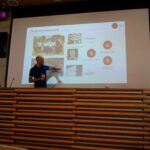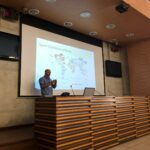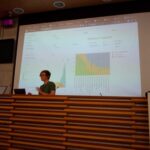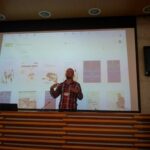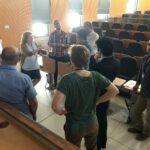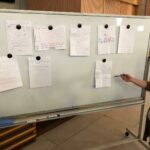Members of the GIScience research group, Dr. Tessio Novack, Dr. Michael Schultz, Dr. Yair Grinberger, Prof. Dr. Alexander Zipf, along with Dr. Peter Mooney of Maynooth University, Ireland, organized a pre-conference workshop as part of the AGILE 2019 conference in Limassol. The workshop titled “Geographical and Cultural Aspects of Geoinformation: Issues and Solutions (geoCultGIS)” aimed at developing a discussion around the constraints geo-cultural contexts put on the generalizability and transferability of geoinformatic methods and geographical data, while also considering the approaches for handling these.
The workshop included a mix of research talks with an open discussion around the themes of the workshop and attracted multiple participants from diverse research and cultural backgrounds such as Dr. Andrea Ballatore (Birkbeck, University of London), Prof. Catherine Jones (University of Luxemburg), Prof. Toshihiro Osaragi (Tokyo Institute of Technology), Dr. Stefan Steiniger (Pontificia Universidad Catolica de Chile), and Mr. Yoav Zohar (Israeli Police). The research talks included an introductory talk by Dr. Novack, a study of the institutional contexts of OpenStreetMap data by Dr. Grinberger, a presentation about the spatial signatures of places by Mr. Rui Zhu of UC Santa Barbara, and an inquiry into the representation of urban green spaces in OpenStreetMap across different regions by Ms. Christina Ludwig of Heidelberg’s GIScience team.
These presentations stimulated a World Cafe–style workshop during the afternoon, led by Dr. Schultz, in which the group discussed the issues, open questions, and approaches related to geo-cultural contexts relevant to each of the participants’ research projects. The discussion targeted the identification of geo-cultural elements resilient to context and therefore transferable, using the metaphor of the Glass Bead Game as inspiration. Disaster response was identified as particularly suitable vehicle of thought to communicate geo-cultural aspects. Essential spatial parameters that were understood as linked to geo-cultural aspects included security, social, emotional, technological and economic contextual aspects.
The outputs of the workshop will soon be published in the form of online proceedings with their own DOI. This will be followed by a Call for Papers for a special issue of Transactions in GIS focusing on the themes of the workshop. For more information, see the workshop’s website.



